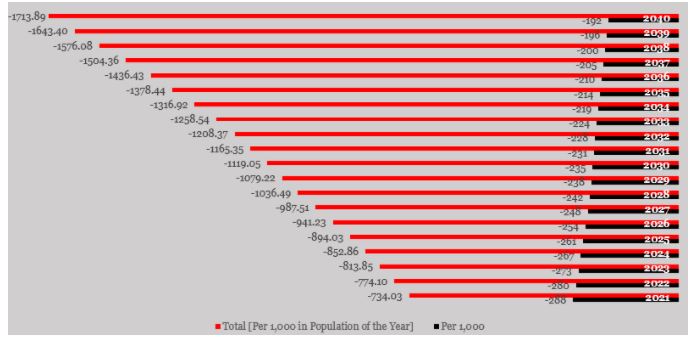
In recent years, the world has witnessed a significant exodus of Nigerian youths to Western countries and Europe. The quest for better opportunities, education, and improved living standards has driven this migration wave. This piece delves into the challenges posed by this phenomenon and explores pathways for Nigeria to address them, while also highlighting opportunities for those who choose to remain in their homeland.
Departure and its Impact
The departure of the youth has left a profound mark on various sectors, particularly education, technology, banking, and law. These sectors bear the brunt of the talent drain as skilled professionals seek their fortunes abroad. The education sector, which should be the backbone of a nation’s progress, witnesses a loss of educators and academicians to foreign shores. This exodus results in a shortage of experienced teachers and researchers, which, in turn, affects the quality of education in the country.
The technology sector in Nigeria, which has been experiencing rapid growth and innovation, also faces a significant setback due to this migration. The departure of tech-savvy youths leaves tech startups and companies in need of skilled workers. This exodus disrupts the technology landscape, stalling the growth of this promising industry. The banking and financial sector grapples with a talent shortage, and the law industry, which relies on experienced legal professionals, sees a steady outflow of talent. Both of these sectors require an influx of fresh minds and seasoned experts to thrive.
Register for Tekedia Mini-MBA edition 19 (Feb 9 – May 2, 2026): big discounts for early bird.
Tekedia AI in Business Masterclass opens registrations.
Join Tekedia Capital Syndicate and co-invest in great global startups.
Register for Tekedia AI Lab: From Technical Design to Deployment (next edition begins Jan 24 2026).
The Root Causes
To understand this migration wave, we must consider its underlying causes. Economic factors play a significant role, as Nigeria grapples with limited job opportunities and high youth unemployment rates. The desire for financial stability pushes young Nigerians abroad, where they hope to secure better-paying jobs.
Social and political instability also act as powerful push factors. Instability can discourage individuals from investing their time and skills in a nation where their future remains uncertain. Furthermore, the erosion of trust in local institutions impacts sectors like banking and law. In a climate where people lack confidence in the justice system and financial institutions, they may be less inclined to build their careers within these sectors.
Youth aspirations are another driving force behind this migration. The dream of attaining a higher quality of life abroad often lures young Nigerians. Improved access to healthcare, education, and a higher standard of living are powerful motivators.
Addressing the Challenge
To mitigate the challenges posed by youth migration, Nigeria must embark on a multifaceted approach. Firstly, it should strive to enhance educational and job opportunities within its borders. Investments in education, both in terms of quality and access, are crucial. Providing youths with opportunities to gain valuable skills and knowledge can encourage them to stay and contribute to the nation’s development.
Political and social stability must also be a priority. A stable political environment and a strong social fabric instil confidence in the nation’s future, making it more appealing for its youth to stay and contribute to its growth. Strengthening local institutions and restoring trust in them is essential, especially in sectors like banking and law. Efforts to improve transparency and accountability can help regain public trust and encourage young professionals to build their careers at home.
Furthermore, Nigeria should consider programs and incentives that attract skilled expatriates back to their homeland. Leveraging the knowledge and experience of those who have succeeded abroad can greatly benefit the country.
Opportunities Within Nigeria
While many Nigerian youths migrate in search of better opportunities, there are emerging prospects within the country itself. Nigeria’s technology sector, for instance, is growing at an impressive rate. The nation’s young and vibrant population presents a significant advantage for innovation. Encouraging entrepreneurship, supporting startups, and fostering a culture of innovation can harness the potential of local talent.
The banking industry also offers room for investment and growth. Nigeria’s large population, coupled with increasing access to financial services, creates a fertile ground for the banking sector to thrive. The legal landscape in Nigeria is evolving as well. Legal reforms are gradually improving the legal framework, offering exciting opportunities for those in the legal profession to make a positive impact.
Encouraging Reverse Migration
To encourage the return of skilled expatriates and reverse the brain drain, Nigeria should create incentives for their homecoming. Programs that facilitate reintegration, provide job opportunities, and support entrepreneurship can entice those who have succeeded abroad to return.
Supporting entrepreneurship is particularly crucial. Many expatriates may have gained valuable skills and insights while abroad and could use these to create successful businesses in Nigeria. Establishing mentorship programs and building networks can ease the transition for returnees. Fostering a culture of giving back to the community can also be instrumental in encouraging reverse migration. When professionals see opportunities to make a meaningful impact in their homeland, they are more likely to consider returning.
Collaboration for a Brighter Future
The journey to addressing the challenges of youth migration and seizing the opportunities within Nigeria requires collaboration between the government and the private sector. Government policies play a pivotal role in attracting talent and fostering a conducive environment for businesses to thrive. Public-private partnerships can be instrumental in driving economic growth and job creation.
The migration of Nigerian youths to the West and Europe is a complex issue with both challenges and opportunities. By addressing the root causes of migration, improving local opportunities, and creating a supportive environment for those who choose to return, Nigeria can harness the potential of its young population and ensure a brighter future for the nation. It’s a collective effort, with government, the private sector, and the youth themselves playing pivotal roles in shaping the destiny of the nation.


